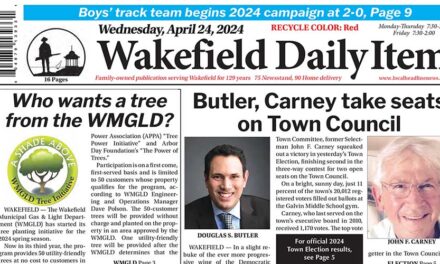Published in the July 26, 2017 edition
BOSTON – A New Salem Street oil tank removal and installation company and its president have been sued for allegedly illegally generating and storing hazardous waste and discharging pollutants into an unpermitted well at its facility and for conducting illegal asbestos removal work at an occupied building in Boston, Attorney General Maura Healey announced yesterday.
“Hazardous waste and asbestos are strictly regulated because they pose a significant risk to the public and the environment,” said AG Healey. “Given that this company is in the business of handling hazardous waste, the alleged violations are especially egregious. We will vigorously prosecute those companies that ignore environmental laws put in place to protect the health and safety of our communities.”
The complaint, filed Friday in Suffolk Superior Court, alleges that Commonwealth Tank, Inc. (CommTank) and its president, Kevin Hoag, reported the wrong hazardous waste generator status to the Massachusetts Department of Environmental Protection (MassDEP) for CommTank’s Wakefield facility. According to the complaint, for at least three years, the defendants generated more than 220 pounds of hazardous waste per month, but did not register as a Small Quantity Generator of hazardous waste and did not comply with requirements for generators with that status designed to provide a safe environment, including proper training in handling practices and emergency procedures.
The complaint also alleges that the defendants unlawfully accumulated waste oil, failed to properly label and close containers holding hazardous waste, and did not keep necessary hazardous waste disposal records. The defendants allegedly maintained an unpermitted well in an area where CommTank conducts vehicle maintenance, allowing waste fluids to drain into the outside environment, in violation of state law.
The AG’s lawsuit further alleges that CommTank and Hoag, who are not licensed asbestos abatement contractors, violated state law by conducting illegal asbestos removal work in a residential and commercial building on Newbury Street in Boston while removing large, industrial boiler units. According to the complaint, the defendants did not comply with required asbestos abatement work practices, including failing to notify MassDEP about asbestos encasing the boilers, failing to use proper air filtration units, failing to contain the asbestos dust and failing to wet the asbestos material during the removal. This illegal asbestos removal could have potentially exposed people accessing the building, passersby in a busy urban area and workers to asbestos fibers.
“Licensed asbestos contractors are an essential requirement to protect workers and the public from exposure to asbestos fibers,” said MassDEP Commissioner Martin Suuberg. “Mass DEP will continue to conduct inspections and will enforce against violators that put the environment and the public at risk.”
Reached for comment this morning, Alan Monico, an operations analyst at CommTank, said that the company did not intentionally violate any laws.
“CommTank did not knowingly violate any environmental regulations at its facility or job sites,” Monico said. “CommTank operates in a highly regulated business and is constantly striving to improve and maintain our environmental compliance. It is CommTank’s position that any alleged violations did not cause any environmental harm.”
The Hazardous Waste Management Act and its regulations establish extensive procedures and protocols to ensure that hazardous wastes are safely managed and monitored for their entire life cycle to protect public health, safety and the environment from dangers associated with wastes that are often highly ignitable, corrosive, reactive or toxic. The success of the cradle-to-grave regulatory system is contingent on companies providing accurate and complete information to MassDEP about the generation, storage, transportation and disposal of hazardous waste.
Asbestos is a mineral fiber that is used in a wide variety of building materials. If asbestos is improperly handled or maintained, fibers can be released into the air and inhaled, potentially resulting in life-threatening illnesses, including asbestosis, lung cancer and mesothelioma. Asbestosis is a serious, progressive, long-term non-cancer disease of the lungs for which there is no known effective treatment. Mesothelioma is a rare form of cancer that is found in the thin membranes of the lung, chest, abdomen and heart, that may not show up until many years after exposure, and that has no known cure, although treatment methods are available to address the effects of the disease.
The AG’s Office is seeking civil penalties and a permanent injunction requiring the defendants to comply with applicable environmental laws.
This case is being handled by Assistant Attorney General Meghan Davoren and Deputy Division Chief Betsy Harper, both of Attorney General Healey’s Environmental Protection Division, with assistance from Senior Regional Counsel Jeanne Argento, Environmental Analyst Matthew Barber and Asbestos Program Section Chief John MacAuley of MassDEP’s Northeast Regional Office.




